E-Commerce Integration and Digital Innovations in the Travel Industry
VerifiedAdded on 2023/07/20
|14
|4315
|381
Case Study
AI Summary
This case study explores how e-commerce integration enhances customer experience within the travel industry, focusing on the traveler's consumer decision journey. It highlights the importance of personalization, efficient booking processes, and digital innovations in the pre-trip, active tourism, and post-purchase phases. The study references PwC reports that emphasize the impact of customer experience on brand loyalty, and also McKinsey & Company reports that highlight the importance of automation. Case studies of G Adventures, American Express Global Business Travel (GBT), TUI Group, and Leonardo Hotels demonstrate how these companies use e-commerce and innovative technologies like machine learning and virtual cards to improve customer satisfaction and foster long-term relationships. The paper concludes that prioritizing customer-centric strategies and adapting to the evolving digital landscape are crucial for travel businesses to thrive in the post-pandemic era.
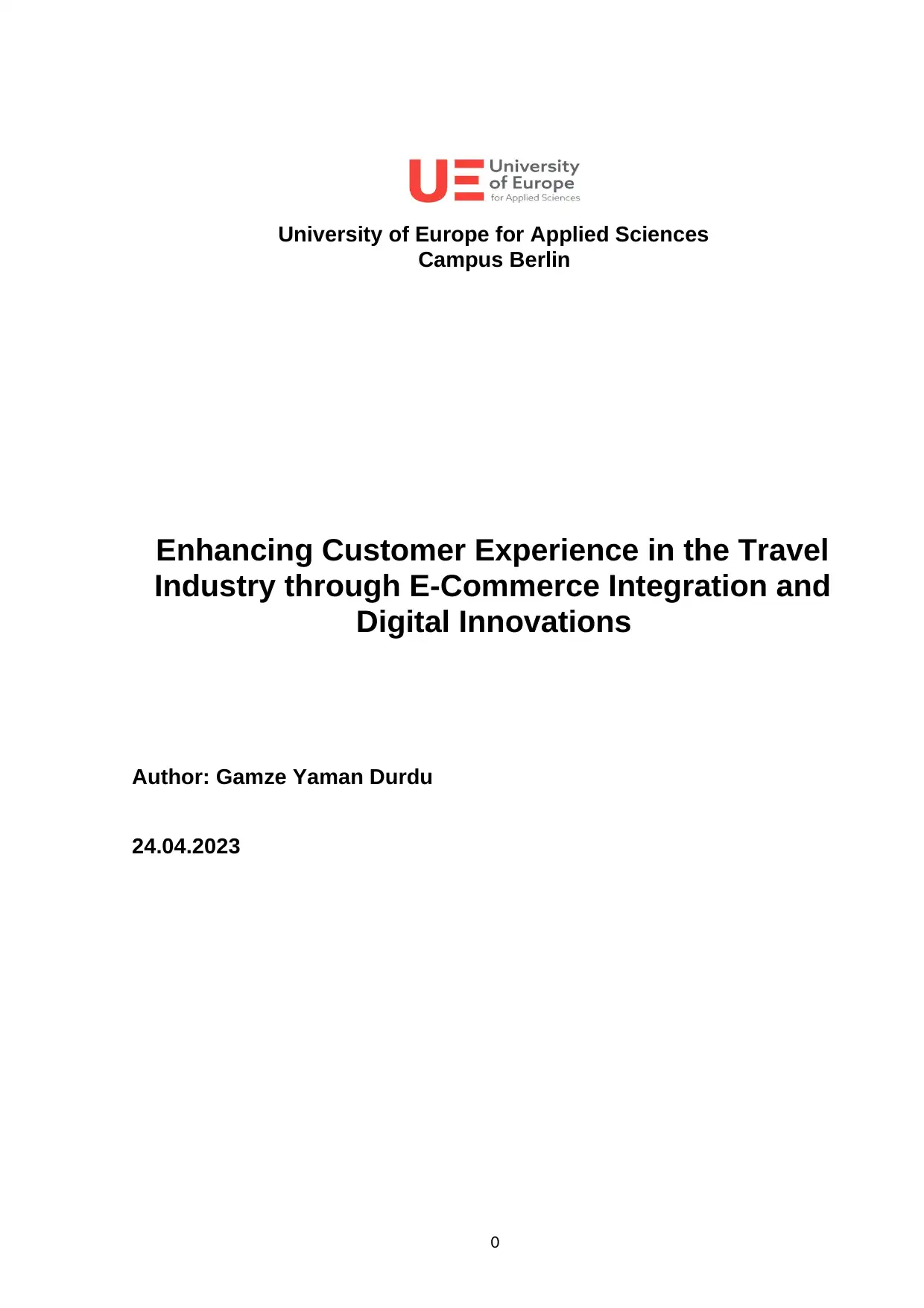
0
University of Europe for Applied Sciences
Campus Berlin
Enhancing Customer Experience in the Travel
Industry through E-Commerce Integration and
Digital Innovations
Author: Gamze Yaman Durdu
24.04.2023
University of Europe for Applied Sciences
Campus Berlin
Enhancing Customer Experience in the Travel
Industry through E-Commerce Integration and
Digital Innovations
Author: Gamze Yaman Durdu
24.04.2023
Paraphrase This Document
Need a fresh take? Get an instant paraphrase of this document with our AI Paraphraser
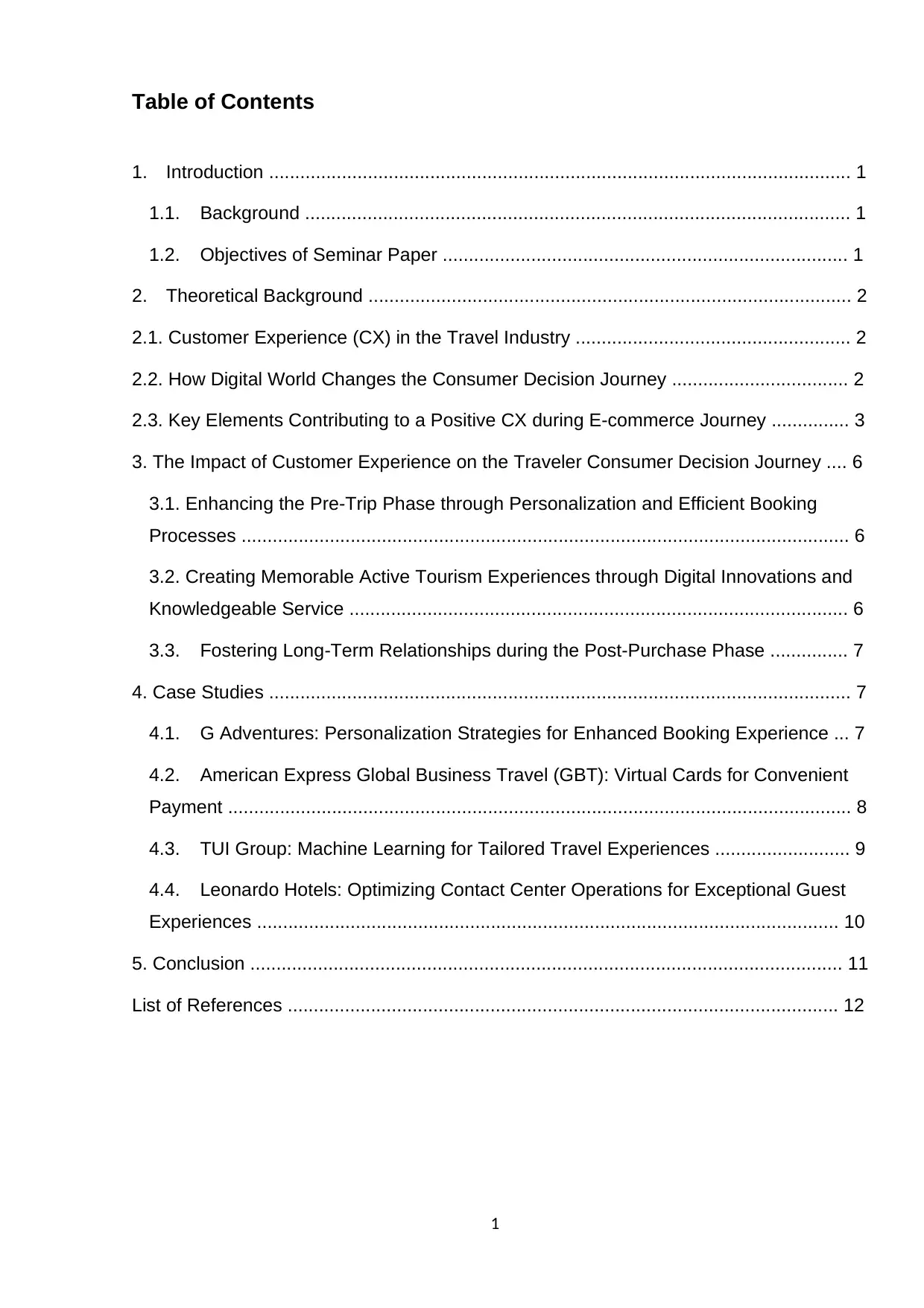
1
Table of Contents
1. Introduction ................................................................................................................ 1
1.1. Background ......................................................................................................... 1
1.2. Objectives of Seminar Paper .............................................................................. 1
2. Theoretical Background ............................................................................................. 2
2.1. Customer Experience (CX) in the Travel Industry ..................................................... 2
2.2. How Digital World Changes the Consumer Decision Journey .................................. 2
2.3. Key Elements Contributing to a Positive CX during E-commerce Journey ............... 3
3. The Impact of Customer Experience on the Traveler Consumer Decision Journey .... 6
3.1. Enhancing the Pre-Trip Phase through Personalization and Efficient Booking
Processes ..................................................................................................................... 6
3.2. Creating Memorable Active Tourism Experiences through Digital Innovations and
Knowledgeable Service ................................................................................................ 6
3.3. Fostering Long-Term Relationships during the Post-Purchase Phase ............... 7
4. Case Studies ................................................................................................................ 7
4.1. G Adventures: Personalization Strategies for Enhanced Booking Experience ... 7
4.2. American Express Global Business Travel (GBT): Virtual Cards for Convenient
Payment ........................................................................................................................ 8
4.3. TUI Group: Machine Learning for Tailored Travel Experiences .......................... 9
4.4. Leonardo Hotels: Optimizing Contact Center Operations for Exceptional Guest
Experiences ................................................................................................................ 10
5. Conclusion .................................................................................................................. 11
List of References .......................................................................................................... 12
Table of Contents
1. Introduction ................................................................................................................ 1
1.1. Background ......................................................................................................... 1
1.2. Objectives of Seminar Paper .............................................................................. 1
2. Theoretical Background ............................................................................................. 2
2.1. Customer Experience (CX) in the Travel Industry ..................................................... 2
2.2. How Digital World Changes the Consumer Decision Journey .................................. 2
2.3. Key Elements Contributing to a Positive CX during E-commerce Journey ............... 3
3. The Impact of Customer Experience on the Traveler Consumer Decision Journey .... 6
3.1. Enhancing the Pre-Trip Phase through Personalization and Efficient Booking
Processes ..................................................................................................................... 6
3.2. Creating Memorable Active Tourism Experiences through Digital Innovations and
Knowledgeable Service ................................................................................................ 6
3.3. Fostering Long-Term Relationships during the Post-Purchase Phase ............... 7
4. Case Studies ................................................................................................................ 7
4.1. G Adventures: Personalization Strategies for Enhanced Booking Experience ... 7
4.2. American Express Global Business Travel (GBT): Virtual Cards for Convenient
Payment ........................................................................................................................ 8
4.3. TUI Group: Machine Learning for Tailored Travel Experiences .......................... 9
4.4. Leonardo Hotels: Optimizing Contact Center Operations for Exceptional Guest
Experiences ................................................................................................................ 10
5. Conclusion .................................................................................................................. 11
List of References .......................................................................................................... 12
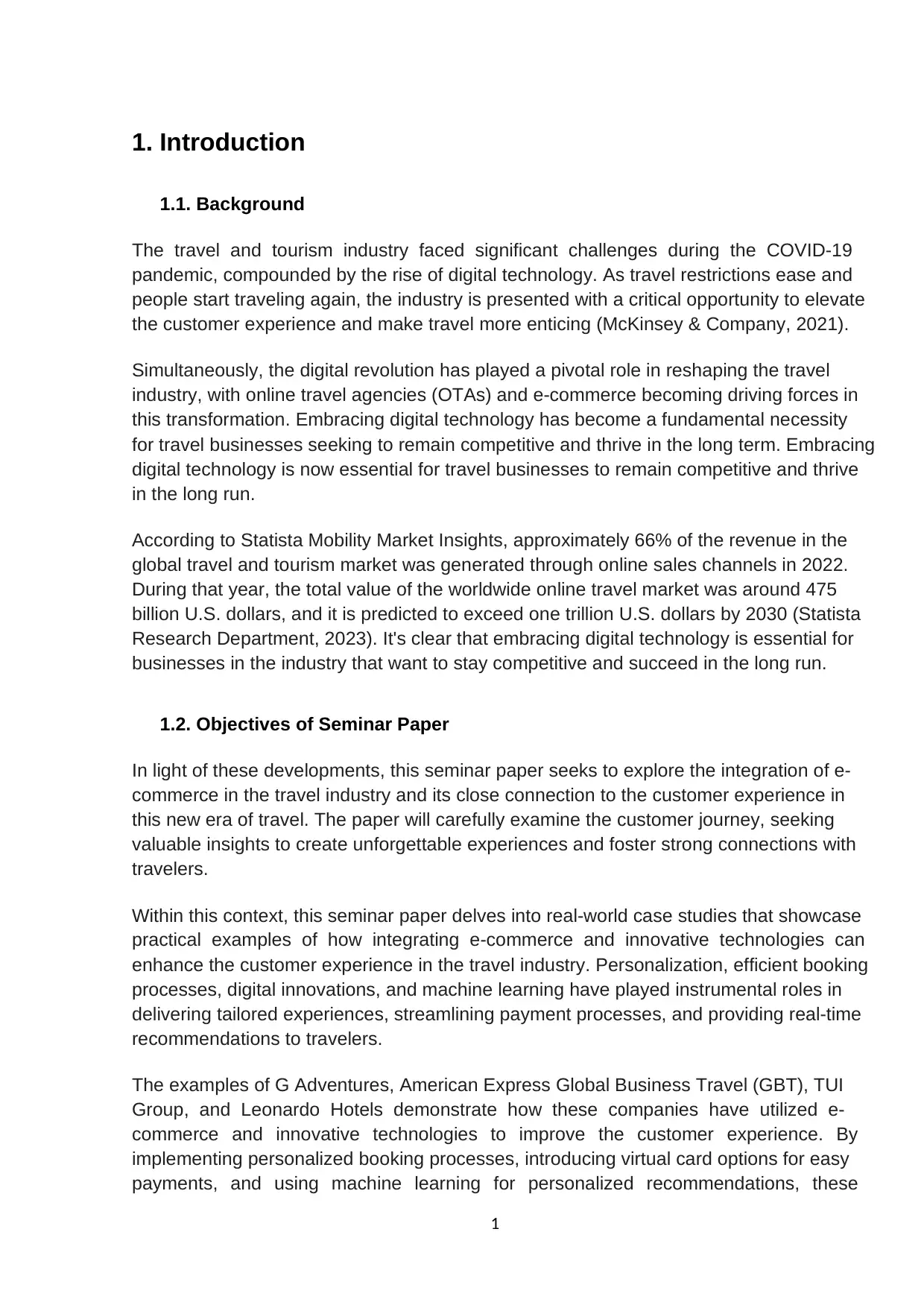
1
1. Introduction
1.1. Background
The travel and tourism industry faced significant challenges during the COVID-19
pandemic, compounded by the rise of digital technology. As travel restrictions ease and
people start traveling again, the industry is presented with a critical opportunity to elevate
the customer experience and make travel more enticing (McKinsey & Company, 2021).
Simultaneously, the digital revolution has played a pivotal role in reshaping the travel
industry, with online travel agencies (OTAs) and e-commerce becoming driving forces in
this transformation. Embracing digital technology has become a fundamental necessity
for travel businesses seeking to remain competitive and thrive in the long term. Embracing
digital technology is now essential for travel businesses to remain competitive and thrive
in the long run.
According to Statista Mobility Market Insights, approximately 66% of the revenue in the
global travel and tourism market was generated through online sales channels in 2022.
During that year, the total value of the worldwide online travel market was around 475
billion U.S. dollars, and it is predicted to exceed one trillion U.S. dollars by 2030 (Statista
Research Department, 2023). It's clear that embracing digital technology is essential for
businesses in the industry that want to stay competitive and succeed in the long run.
1.2. Objectives of Seminar Paper
In light of these developments, this seminar paper seeks to explore the integration of e-
commerce in the travel industry and its close connection to the customer experience in
this new era of travel. The paper will carefully examine the customer journey, seeking
valuable insights to create unforgettable experiences and foster strong connections with
travelers.
Within this context, this seminar paper delves into real-world case studies that showcase
practical examples of how integrating e-commerce and innovative technologies can
enhance the customer experience in the travel industry. Personalization, efficient booking
processes, digital innovations, and machine learning have played instrumental roles in
delivering tailored experiences, streamlining payment processes, and providing real-time
recommendations to travelers.
The examples of G Adventures, American Express Global Business Travel (GBT), TUI
Group, and Leonardo Hotels demonstrate how these companies have utilized e-
commerce and innovative technologies to improve the customer experience. By
implementing personalized booking processes, introducing virtual card options for easy
payments, and using machine learning for personalized recommendations, these
1. Introduction
1.1. Background
The travel and tourism industry faced significant challenges during the COVID-19
pandemic, compounded by the rise of digital technology. As travel restrictions ease and
people start traveling again, the industry is presented with a critical opportunity to elevate
the customer experience and make travel more enticing (McKinsey & Company, 2021).
Simultaneously, the digital revolution has played a pivotal role in reshaping the travel
industry, with online travel agencies (OTAs) and e-commerce becoming driving forces in
this transformation. Embracing digital technology has become a fundamental necessity
for travel businesses seeking to remain competitive and thrive in the long term. Embracing
digital technology is now essential for travel businesses to remain competitive and thrive
in the long run.
According to Statista Mobility Market Insights, approximately 66% of the revenue in the
global travel and tourism market was generated through online sales channels in 2022.
During that year, the total value of the worldwide online travel market was around 475
billion U.S. dollars, and it is predicted to exceed one trillion U.S. dollars by 2030 (Statista
Research Department, 2023). It's clear that embracing digital technology is essential for
businesses in the industry that want to stay competitive and succeed in the long run.
1.2. Objectives of Seminar Paper
In light of these developments, this seminar paper seeks to explore the integration of e-
commerce in the travel industry and its close connection to the customer experience in
this new era of travel. The paper will carefully examine the customer journey, seeking
valuable insights to create unforgettable experiences and foster strong connections with
travelers.
Within this context, this seminar paper delves into real-world case studies that showcase
practical examples of how integrating e-commerce and innovative technologies can
enhance the customer experience in the travel industry. Personalization, efficient booking
processes, digital innovations, and machine learning have played instrumental roles in
delivering tailored experiences, streamlining payment processes, and providing real-time
recommendations to travelers.
The examples of G Adventures, American Express Global Business Travel (GBT), TUI
Group, and Leonardo Hotels demonstrate how these companies have utilized e-
commerce and innovative technologies to improve the customer experience. By
implementing personalized booking processes, introducing virtual card options for easy
payments, and using machine learning for personalized recommendations, these
⊘ This is a preview!⊘
Do you want full access?
Subscribe today to unlock all pages.

Trusted by 1+ million students worldwide
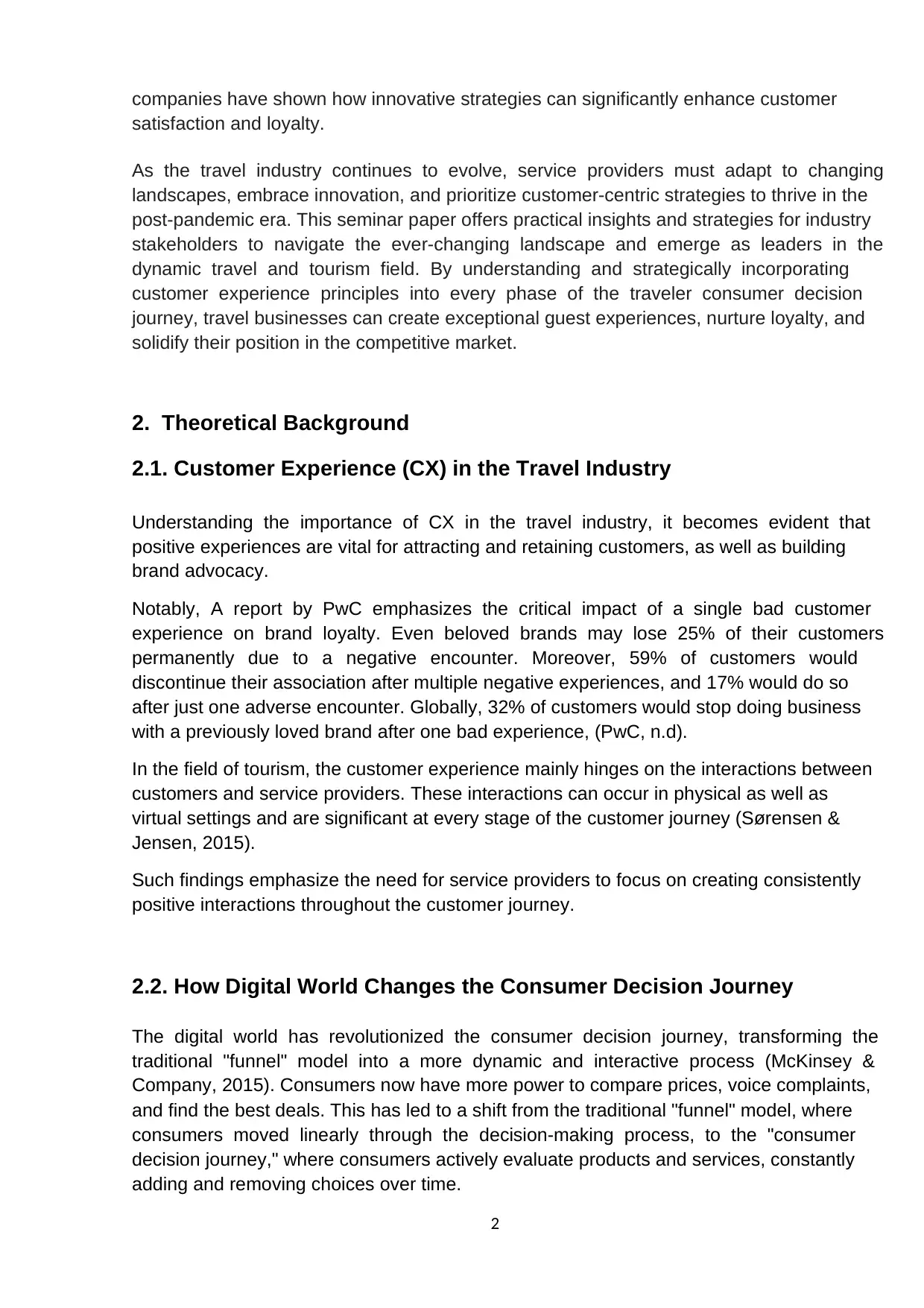
2
companies have shown how innovative strategies can significantly enhance customer
satisfaction and loyalty.
As the travel industry continues to evolve, service providers must adapt to changing
landscapes, embrace innovation, and prioritize customer-centric strategies to thrive in the
post-pandemic era. This seminar paper offers practical insights and strategies for industry
stakeholders to navigate the ever-changing landscape and emerge as leaders in the
dynamic travel and tourism field. By understanding and strategically incorporating
customer experience principles into every phase of the traveler consumer decision
journey, travel businesses can create exceptional guest experiences, nurture loyalty, and
solidify their position in the competitive market.
2. Theoretical Background
2.1. Customer Experience (CX) in the Travel Industry
Understanding the importance of CX in the travel industry, it becomes evident that
positive experiences are vital for attracting and retaining customers, as well as building
brand advocacy.
Notably, A report by PwC emphasizes the critical impact of a single bad customer
experience on brand loyalty. Even beloved brands may lose 25% of their customers
permanently due to a negative encounter. Moreover, 59% of customers would
discontinue their association after multiple negative experiences, and 17% would do so
after just one adverse encounter. Globally, 32% of customers would stop doing business
with a previously loved brand after one bad experience, (PwC, n.d).
In the field of tourism, the customer experience mainly hinges on the interactions between
customers and service providers. These interactions can occur in physical as well as
virtual settings and are significant at every stage of the customer journey (Sørensen &
Jensen, 2015).
Such findings emphasize the need for service providers to focus on creating consistently
positive interactions throughout the customer journey.
2.2. How Digital World Changes the Consumer Decision Journey
The digital world has revolutionized the consumer decision journey, transforming the
traditional "funnel" model into a more dynamic and interactive process (McKinsey &
Company, 2015). Consumers now have more power to compare prices, voice complaints,
and find the best deals. This has led to a shift from the traditional "funnel" model, where
consumers moved linearly through the decision-making process, to the "consumer
decision journey," where consumers actively evaluate products and services, constantly
adding and removing choices over time.
companies have shown how innovative strategies can significantly enhance customer
satisfaction and loyalty.
As the travel industry continues to evolve, service providers must adapt to changing
landscapes, embrace innovation, and prioritize customer-centric strategies to thrive in the
post-pandemic era. This seminar paper offers practical insights and strategies for industry
stakeholders to navigate the ever-changing landscape and emerge as leaders in the
dynamic travel and tourism field. By understanding and strategically incorporating
customer experience principles into every phase of the traveler consumer decision
journey, travel businesses can create exceptional guest experiences, nurture loyalty, and
solidify their position in the competitive market.
2. Theoretical Background
2.1. Customer Experience (CX) in the Travel Industry
Understanding the importance of CX in the travel industry, it becomes evident that
positive experiences are vital for attracting and retaining customers, as well as building
brand advocacy.
Notably, A report by PwC emphasizes the critical impact of a single bad customer
experience on brand loyalty. Even beloved brands may lose 25% of their customers
permanently due to a negative encounter. Moreover, 59% of customers would
discontinue their association after multiple negative experiences, and 17% would do so
after just one adverse encounter. Globally, 32% of customers would stop doing business
with a previously loved brand after one bad experience, (PwC, n.d).
In the field of tourism, the customer experience mainly hinges on the interactions between
customers and service providers. These interactions can occur in physical as well as
virtual settings and are significant at every stage of the customer journey (Sørensen &
Jensen, 2015).
Such findings emphasize the need for service providers to focus on creating consistently
positive interactions throughout the customer journey.
2.2. How Digital World Changes the Consumer Decision Journey
The digital world has revolutionized the consumer decision journey, transforming the
traditional "funnel" model into a more dynamic and interactive process (McKinsey &
Company, 2015). Consumers now have more power to compare prices, voice complaints,
and find the best deals. This has led to a shift from the traditional "funnel" model, where
consumers moved linearly through the decision-making process, to the "consumer
decision journey," where consumers actively evaluate products and services, constantly
adding and removing choices over time.
Paraphrase This Document
Need a fresh take? Get an instant paraphrase of this document with our AI Paraphraser
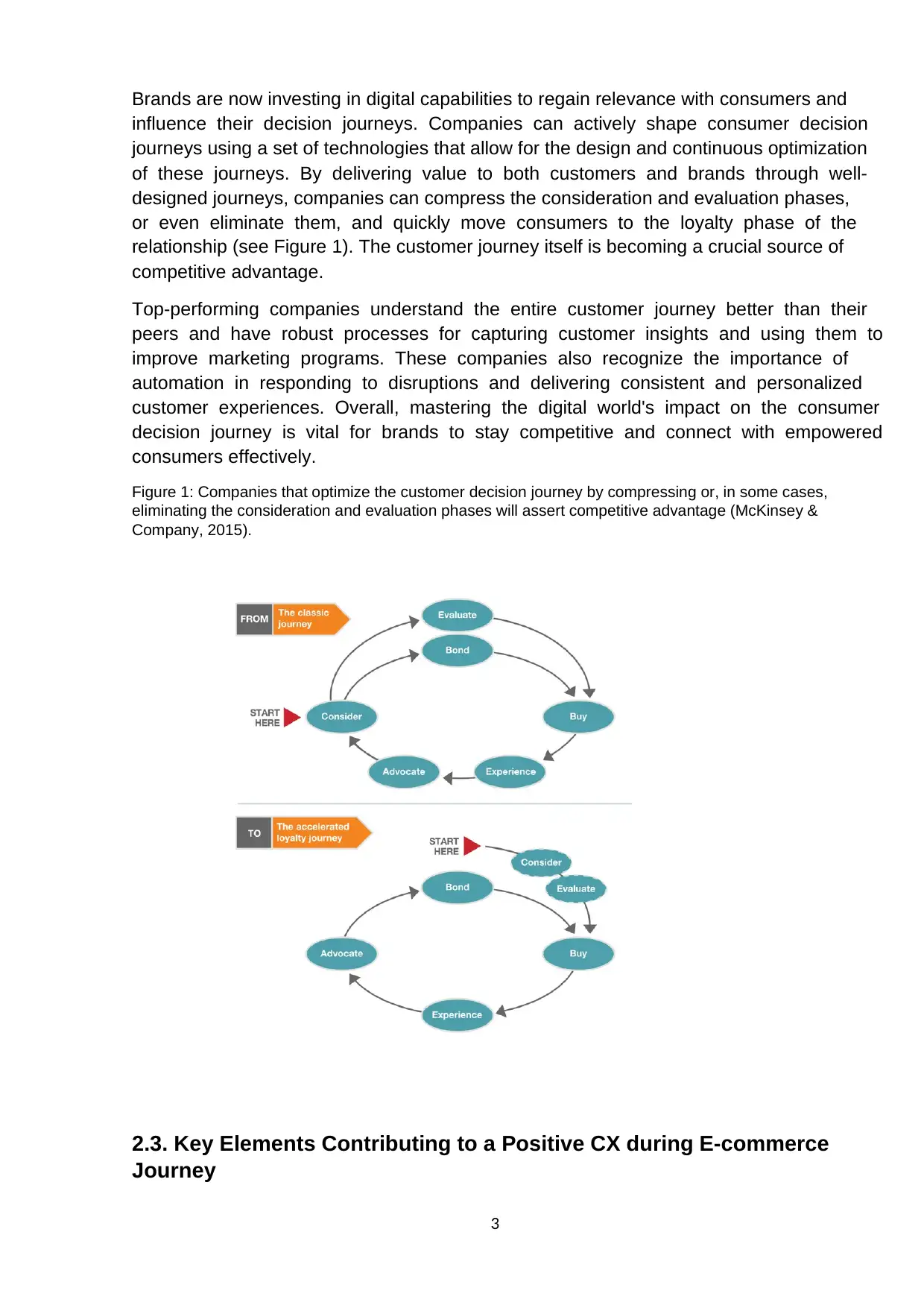
3
Brands are now investing in digital capabilities to regain relevance with consumers and
influence their decision journeys. Companies can actively shape consumer decision
journeys using a set of technologies that allow for the design and continuous optimization
of these journeys. By delivering value to both customers and brands through well-
designed journeys, companies can compress the consideration and evaluation phases,
or even eliminate them, and quickly move consumers to the loyalty phase of the
relationship (see Figure 1). The customer journey itself is becoming a crucial source of
competitive advantage.
Top-performing companies understand the entire customer journey better than their
peers and have robust processes for capturing customer insights and using them to
improve marketing programs. These companies also recognize the importance of
automation in responding to disruptions and delivering consistent and personalized
customer experiences. Overall, mastering the digital world's impact on the consumer
decision journey is vital for brands to stay competitive and connect with empowered
consumers effectively.
Figure 1: Companies that optimize the customer decision journey by compressing or, in some cases,
eliminating the consideration and evaluation phases will assert competitive advantage (McKinsey &
Company, 2015).
2.3. Key Elements Contributing to a Positive CX during E-commerce
Journey
Brands are now investing in digital capabilities to regain relevance with consumers and
influence their decision journeys. Companies can actively shape consumer decision
journeys using a set of technologies that allow for the design and continuous optimization
of these journeys. By delivering value to both customers and brands through well-
designed journeys, companies can compress the consideration and evaluation phases,
or even eliminate them, and quickly move consumers to the loyalty phase of the
relationship (see Figure 1). The customer journey itself is becoming a crucial source of
competitive advantage.
Top-performing companies understand the entire customer journey better than their
peers and have robust processes for capturing customer insights and using them to
improve marketing programs. These companies also recognize the importance of
automation in responding to disruptions and delivering consistent and personalized
customer experiences. Overall, mastering the digital world's impact on the consumer
decision journey is vital for brands to stay competitive and connect with empowered
consumers effectively.
Figure 1: Companies that optimize the customer decision journey by compressing or, in some cases,
eliminating the consideration and evaluation phases will assert competitive advantage (McKinsey &
Company, 2015).
2.3. Key Elements Contributing to a Positive CX during E-commerce
Journey
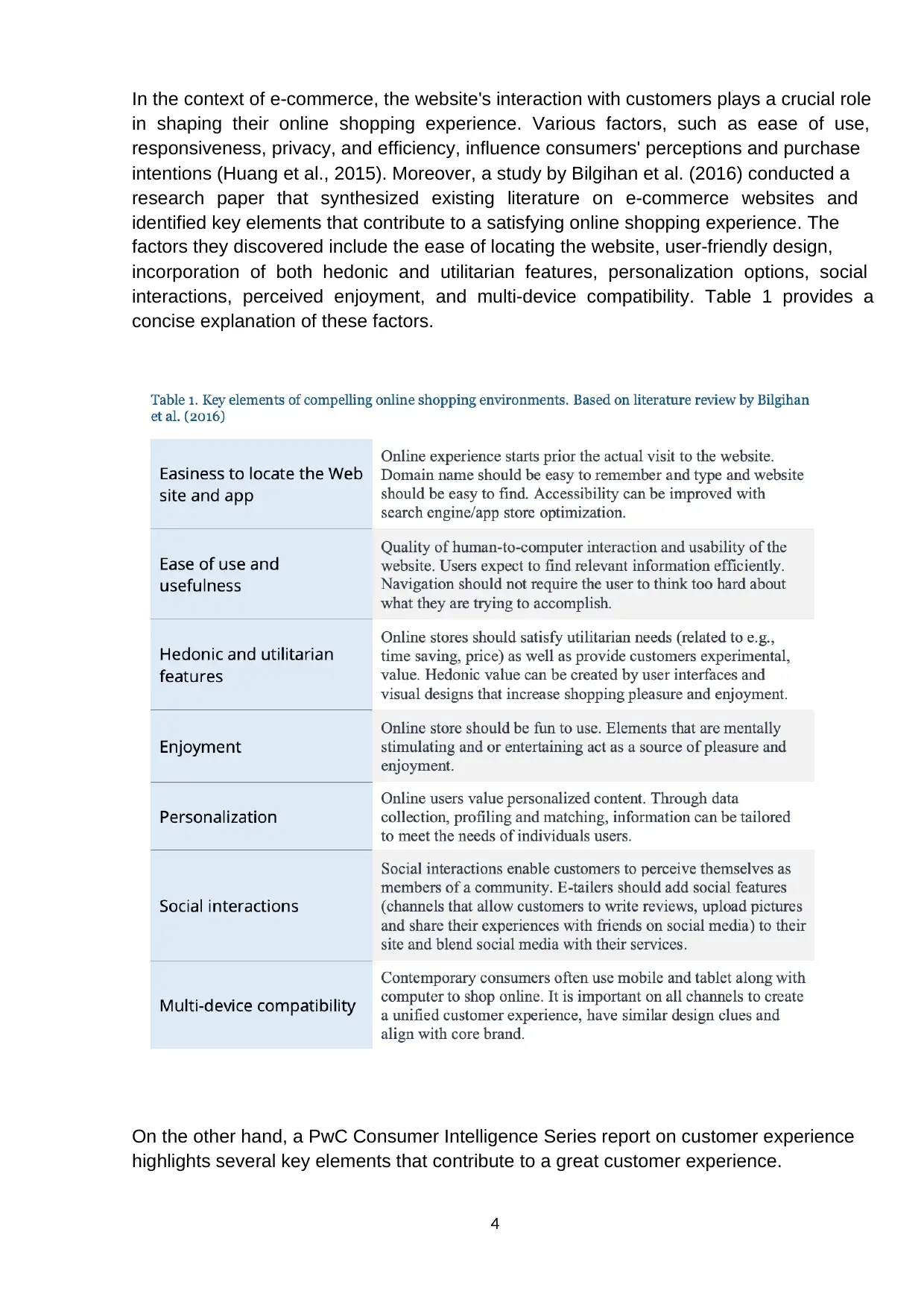
4
In the context of e-commerce, the website's interaction with customers plays a crucial role
in shaping their online shopping experience. Various factors, such as ease of use,
responsiveness, privacy, and efficiency, influence consumers' perceptions and purchase
intentions (Huang et al., 2015). Moreover, a study by Bilgihan et al. (2016) conducted a
research paper that synthesized existing literature on e-commerce websites and
identified key elements that contribute to a satisfying online shopping experience. The
factors they discovered include the ease of locating the website, user-friendly design,
incorporation of both hedonic and utilitarian features, personalization options, social
interactions, perceived enjoyment, and multi-device compatibility. Table 1 provides a
concise explanation of these factors.
Table 1. Key elements of compelling online shopping environments. (Bilgihan, Kandampully, & Zhang,
2016)
On the other hand, a PwC Consumer Intelligence Series report on customer experience
highlights several key elements that contribute to a great customer experience.
In the context of e-commerce, the website's interaction with customers plays a crucial role
in shaping their online shopping experience. Various factors, such as ease of use,
responsiveness, privacy, and efficiency, influence consumers' perceptions and purchase
intentions (Huang et al., 2015). Moreover, a study by Bilgihan et al. (2016) conducted a
research paper that synthesized existing literature on e-commerce websites and
identified key elements that contribute to a satisfying online shopping experience. The
factors they discovered include the ease of locating the website, user-friendly design,
incorporation of both hedonic and utilitarian features, personalization options, social
interactions, perceived enjoyment, and multi-device compatibility. Table 1 provides a
concise explanation of these factors.
Table 1. Key elements of compelling online shopping environments. (Bilgihan, Kandampully, & Zhang,
2016)
On the other hand, a PwC Consumer Intelligence Series report on customer experience
highlights several key elements that contribute to a great customer experience.
⊘ This is a preview!⊘
Do you want full access?
Subscribe today to unlock all pages.

Trusted by 1+ million students worldwide
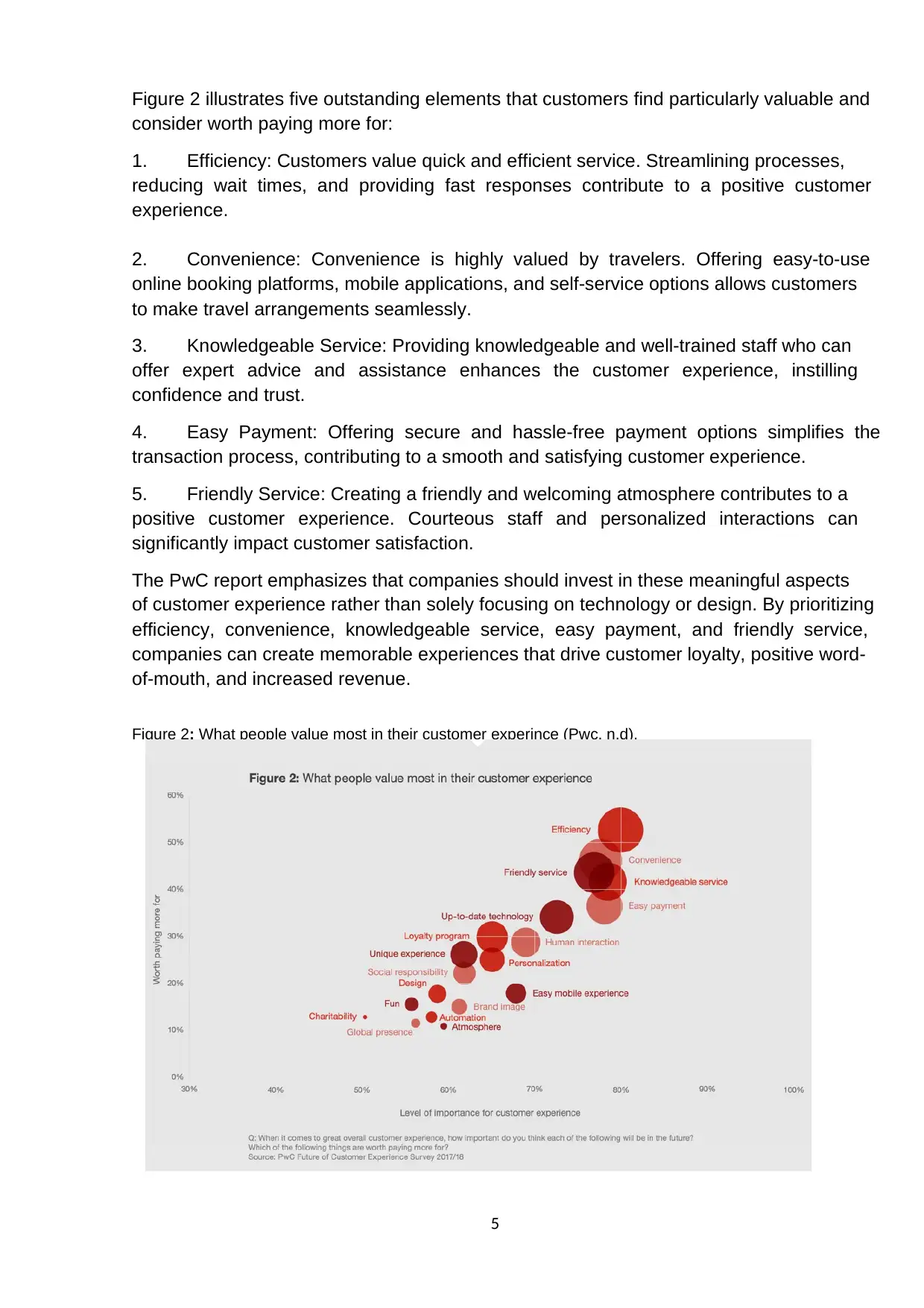
5
Figure 2 illustrates five outstanding elements that customers find particularly valuable and
consider worth paying more for:
1. Efficiency: Customers value quick and efficient service. Streamlining processes,
reducing wait times, and providing fast responses contribute to a positive customer
experience.
2. Convenience: Convenience is highly valued by travelers. Offering easy-to-use
online booking platforms, mobile applications, and self-service options allows customers
to make travel arrangements seamlessly.
3. Knowledgeable Service: Providing knowledgeable and well-trained staff who can
offer expert advice and assistance enhances the customer experience, instilling
confidence and trust.
4. Easy Payment: Offering secure and hassle-free payment options simplifies the
transaction process, contributing to a smooth and satisfying customer experience.
5. Friendly Service: Creating a friendly and welcoming atmosphere contributes to a
positive customer experience. Courteous staff and personalized interactions can
significantly impact customer satisfaction.
The PwC report emphasizes that companies should invest in these meaningful aspects
of customer experience rather than solely focusing on technology or design. By prioritizing
efficiency, convenience, knowledgeable service, easy payment, and friendly service,
companies can create memorable experiences that drive customer loyalty, positive word-
of-mouth, and increased revenue.
Figure 2: What people value most in their customer experince (Pwc, n.d).
Figure 2 illustrates five outstanding elements that customers find particularly valuable and
consider worth paying more for:
1. Efficiency: Customers value quick and efficient service. Streamlining processes,
reducing wait times, and providing fast responses contribute to a positive customer
experience.
2. Convenience: Convenience is highly valued by travelers. Offering easy-to-use
online booking platforms, mobile applications, and self-service options allows customers
to make travel arrangements seamlessly.
3. Knowledgeable Service: Providing knowledgeable and well-trained staff who can
offer expert advice and assistance enhances the customer experience, instilling
confidence and trust.
4. Easy Payment: Offering secure and hassle-free payment options simplifies the
transaction process, contributing to a smooth and satisfying customer experience.
5. Friendly Service: Creating a friendly and welcoming atmosphere contributes to a
positive customer experience. Courteous staff and personalized interactions can
significantly impact customer satisfaction.
The PwC report emphasizes that companies should invest in these meaningful aspects
of customer experience rather than solely focusing on technology or design. By prioritizing
efficiency, convenience, knowledgeable service, easy payment, and friendly service,
companies can create memorable experiences that drive customer loyalty, positive word-
of-mouth, and increased revenue.
Figure 2: What people value most in their customer experince (Pwc, n.d).
Paraphrase This Document
Need a fresh take? Get an instant paraphrase of this document with our AI Paraphraser
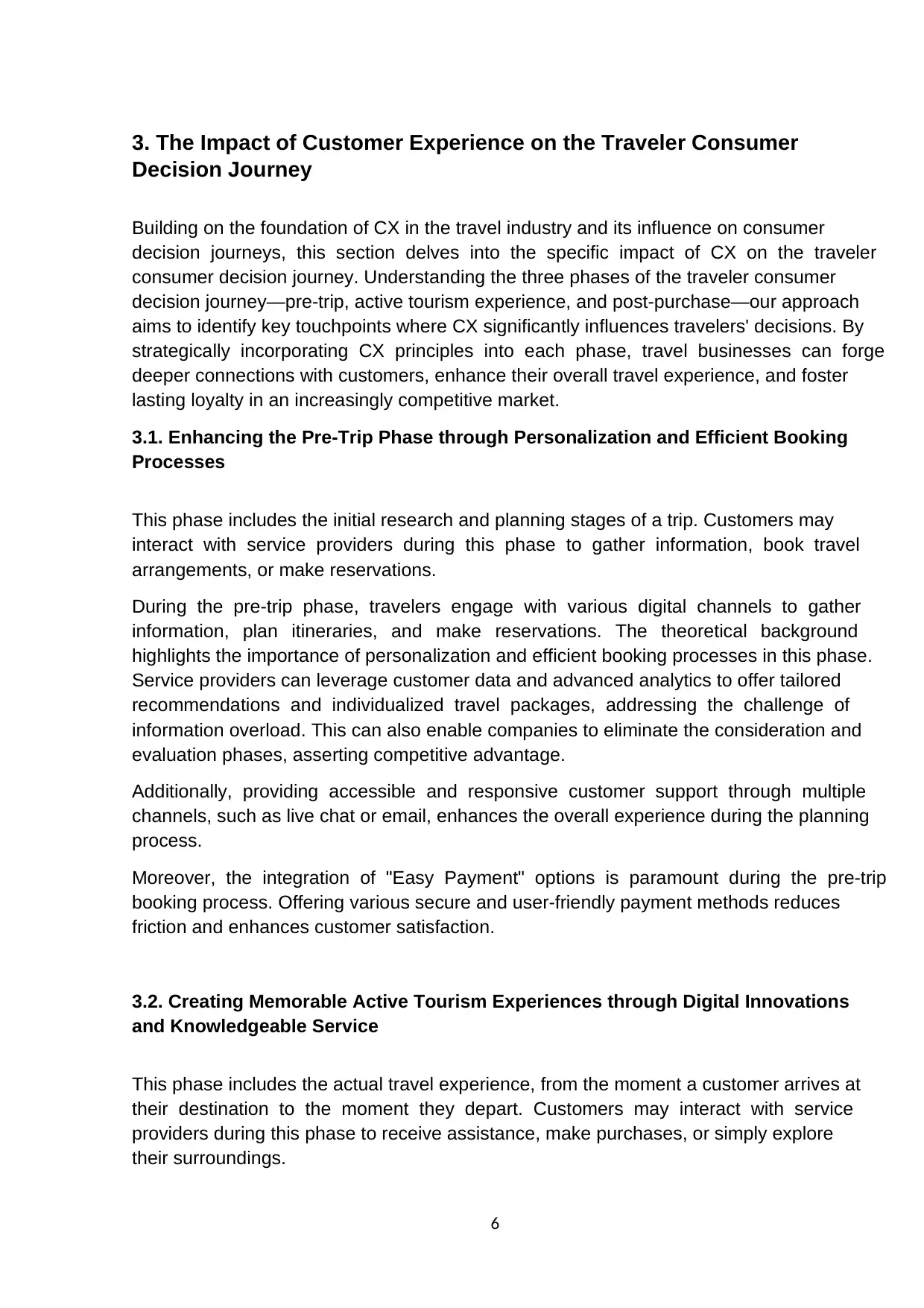
6
3. The Impact of Customer Experience on the Traveler Consumer
Decision Journey
Building on the foundation of CX in the travel industry and its influence on consumer
decision journeys, this section delves into the specific impact of CX on the traveler
consumer decision journey. Understanding the three phases of the traveler consumer
decision journey—pre-trip, active tourism experience, and post-purchase—our approach
aims to identify key touchpoints where CX significantly influences travelers' decisions. By
strategically incorporating CX principles into each phase, travel businesses can forge
deeper connections with customers, enhance their overall travel experience, and foster
lasting loyalty in an increasingly competitive market.
3.1. Enhancing the Pre-Trip Phase through Personalization and Efficient Booking
Processes
This phase includes the initial research and planning stages of a trip. Customers may
interact with service providers during this phase to gather information, book travel
arrangements, or make reservations.
During the pre-trip phase, travelers engage with various digital channels to gather
information, plan itineraries, and make reservations. The theoretical background
highlights the importance of personalization and efficient booking processes in this phase.
Service providers can leverage customer data and advanced analytics to offer tailored
recommendations and individualized travel packages, addressing the challenge of
information overload. This can also enable companies to eliminate the consideration and
evaluation phases, asserting competitive advantage.
Additionally, providing accessible and responsive customer support through multiple
channels, such as live chat or email, enhances the overall experience during the planning
process.
Moreover, the integration of "Easy Payment" options is paramount during the pre-trip
booking process. Offering various secure and user-friendly payment methods reduces
friction and enhances customer satisfaction.
3.2. Creating Memorable Active Tourism Experiences through Digital Innovations
and Knowledgeable Service
This phase includes the actual travel experience, from the moment a customer arrives at
their destination to the moment they depart. Customers may interact with service
providers during this phase to receive assistance, make purchases, or simply explore
their surroundings.
3. The Impact of Customer Experience on the Traveler Consumer
Decision Journey
Building on the foundation of CX in the travel industry and its influence on consumer
decision journeys, this section delves into the specific impact of CX on the traveler
consumer decision journey. Understanding the three phases of the traveler consumer
decision journey—pre-trip, active tourism experience, and post-purchase—our approach
aims to identify key touchpoints where CX significantly influences travelers' decisions. By
strategically incorporating CX principles into each phase, travel businesses can forge
deeper connections with customers, enhance their overall travel experience, and foster
lasting loyalty in an increasingly competitive market.
3.1. Enhancing the Pre-Trip Phase through Personalization and Efficient Booking
Processes
This phase includes the initial research and planning stages of a trip. Customers may
interact with service providers during this phase to gather information, book travel
arrangements, or make reservations.
During the pre-trip phase, travelers engage with various digital channels to gather
information, plan itineraries, and make reservations. The theoretical background
highlights the importance of personalization and efficient booking processes in this phase.
Service providers can leverage customer data and advanced analytics to offer tailored
recommendations and individualized travel packages, addressing the challenge of
information overload. This can also enable companies to eliminate the consideration and
evaluation phases, asserting competitive advantage.
Additionally, providing accessible and responsive customer support through multiple
channels, such as live chat or email, enhances the overall experience during the planning
process.
Moreover, the integration of "Easy Payment" options is paramount during the pre-trip
booking process. Offering various secure and user-friendly payment methods reduces
friction and enhances customer satisfaction.
3.2. Creating Memorable Active Tourism Experiences through Digital Innovations
and Knowledgeable Service
This phase includes the actual travel experience, from the moment a customer arrives at
their destination to the moment they depart. Customers may interact with service
providers during this phase to receive assistance, make purchases, or simply explore
their surroundings.
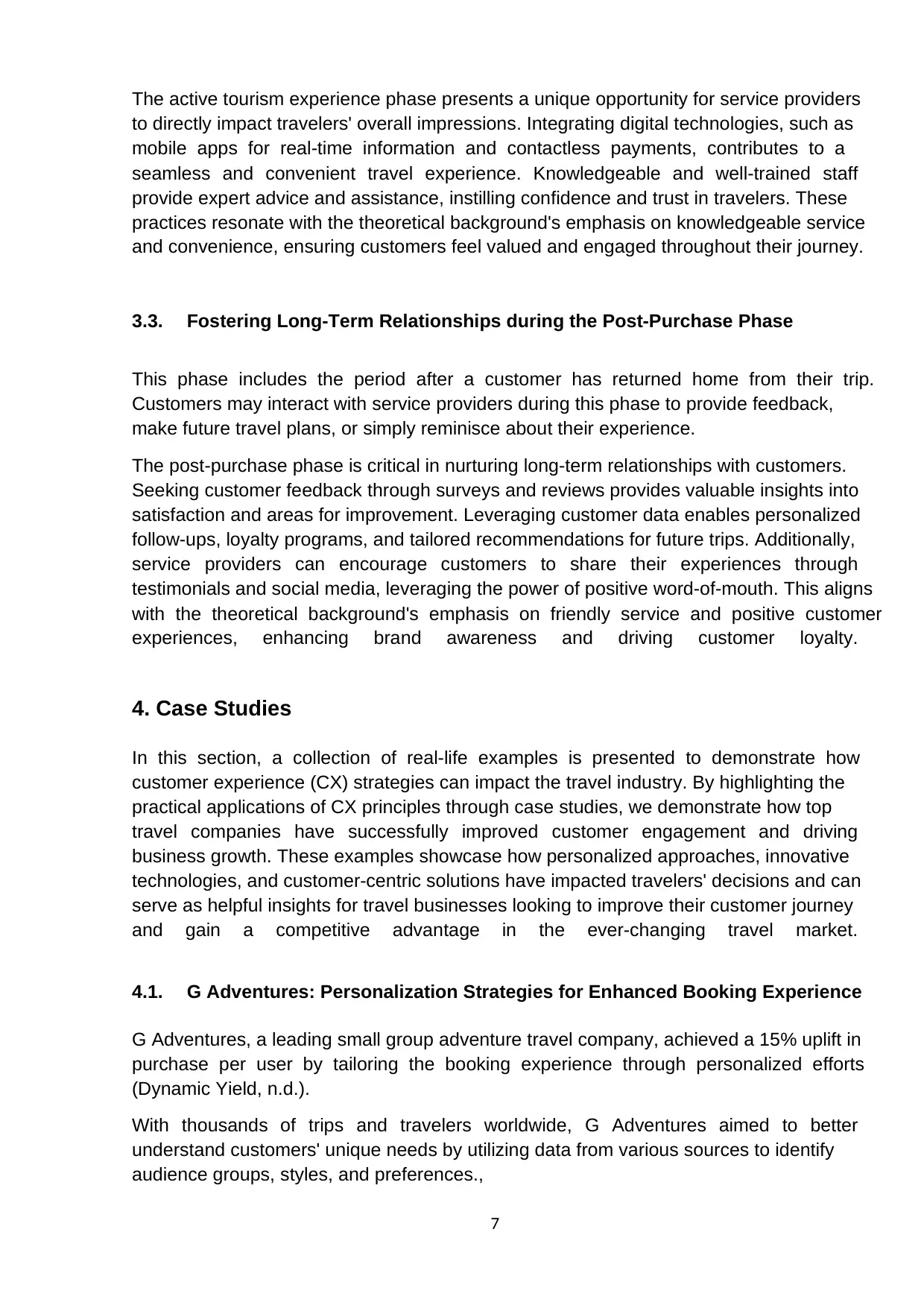
7
The active tourism experience phase presents a unique opportunity for service providers
to directly impact travelers' overall impressions. Integrating digital technologies, such as
mobile apps for real-time information and contactless payments, contributes to a
seamless and convenient travel experience. Knowledgeable and well-trained staff
provide expert advice and assistance, instilling confidence and trust in travelers. These
practices resonate with the theoretical background's emphasis on knowledgeable service
and convenience, ensuring customers feel valued and engaged throughout their journey.
3.3. Fostering Long-Term Relationships during the Post-Purchase Phase
This phase includes the period after a customer has returned home from their trip.
Customers may interact with service providers during this phase to provide feedback,
make future travel plans, or simply reminisce about their experience.
The post-purchase phase is critical in nurturing long-term relationships with customers.
Seeking customer feedback through surveys and reviews provides valuable insights into
satisfaction and areas for improvement. Leveraging customer data enables personalized
follow-ups, loyalty programs, and tailored recommendations for future trips. Additionally,
service providers can encourage customers to share their experiences through
testimonials and social media, leveraging the power of positive word-of-mouth. This aligns
with the theoretical background's emphasis on friendly service and positive customer
experiences, enhancing brand awareness and driving customer loyalty.
4. Case Studies
In this section, a collection of real-life examples is presented to demonstrate how
customer experience (CX) strategies can impact the travel industry. By highlighting the
practical applications of CX principles through case studies, we demonstrate how top
travel companies have successfully improved customer engagement and driving
business growth. These examples showcase how personalized approaches, innovative
technologies, and customer-centric solutions have impacted travelers' decisions and can
serve as helpful insights for travel businesses looking to improve their customer journey
and gain a competitive advantage in the ever-changing travel market.
4.1. G Adventures: Personalization Strategies for Enhanced Booking Experience
G Adventures, a leading small group adventure travel company, achieved a 15% uplift in
purchase per user by tailoring the booking experience through personalized efforts
(Dynamic Yield, n.d.).
With thousands of trips and travelers worldwide, G Adventures aimed to better
understand customers' unique needs by utilizing data from various sources to identify
audience groups, styles, and preferences.,
The active tourism experience phase presents a unique opportunity for service providers
to directly impact travelers' overall impressions. Integrating digital technologies, such as
mobile apps for real-time information and contactless payments, contributes to a
seamless and convenient travel experience. Knowledgeable and well-trained staff
provide expert advice and assistance, instilling confidence and trust in travelers. These
practices resonate with the theoretical background's emphasis on knowledgeable service
and convenience, ensuring customers feel valued and engaged throughout their journey.
3.3. Fostering Long-Term Relationships during the Post-Purchase Phase
This phase includes the period after a customer has returned home from their trip.
Customers may interact with service providers during this phase to provide feedback,
make future travel plans, or simply reminisce about their experience.
The post-purchase phase is critical in nurturing long-term relationships with customers.
Seeking customer feedback through surveys and reviews provides valuable insights into
satisfaction and areas for improvement. Leveraging customer data enables personalized
follow-ups, loyalty programs, and tailored recommendations for future trips. Additionally,
service providers can encourage customers to share their experiences through
testimonials and social media, leveraging the power of positive word-of-mouth. This aligns
with the theoretical background's emphasis on friendly service and positive customer
experiences, enhancing brand awareness and driving customer loyalty.
4. Case Studies
In this section, a collection of real-life examples is presented to demonstrate how
customer experience (CX) strategies can impact the travel industry. By highlighting the
practical applications of CX principles through case studies, we demonstrate how top
travel companies have successfully improved customer engagement and driving
business growth. These examples showcase how personalized approaches, innovative
technologies, and customer-centric solutions have impacted travelers' decisions and can
serve as helpful insights for travel businesses looking to improve their customer journey
and gain a competitive advantage in the ever-changing travel market.
4.1. G Adventures: Personalization Strategies for Enhanced Booking Experience
G Adventures, a leading small group adventure travel company, achieved a 15% uplift in
purchase per user by tailoring the booking experience through personalized efforts
(Dynamic Yield, n.d.).
With thousands of trips and travelers worldwide, G Adventures aimed to better
understand customers' unique needs by utilizing data from various sources to identify
audience groups, styles, and preferences.,
⊘ This is a preview!⊘
Do you want full access?
Subscribe today to unlock all pages.

Trusted by 1+ million students worldwide
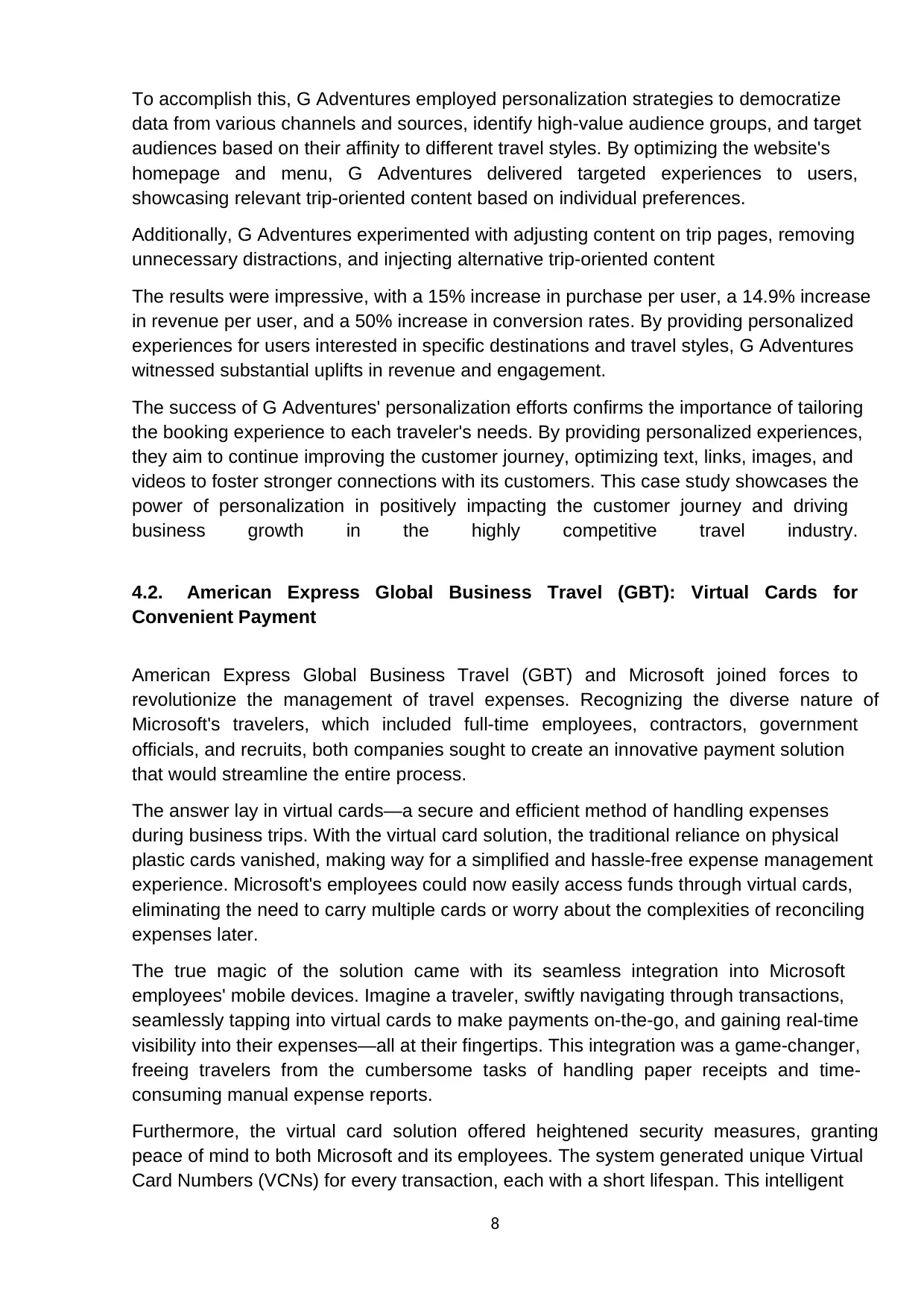
8
To accomplish this, G Adventures employed personalization strategies to democratize
data from various channels and sources, identify high-value audience groups, and target
audiences based on their affinity to different travel styles. By optimizing the website's
homepage and menu, G Adventures delivered targeted experiences to users,
showcasing relevant trip-oriented content based on individual preferences.
Additionally, G Adventures experimented with adjusting content on trip pages, removing
unnecessary distractions, and injecting alternative trip-oriented content
The results were impressive, with a 15% increase in purchase per user, a 14.9% increase
in revenue per user, and a 50% increase in conversion rates. By providing personalized
experiences for users interested in specific destinations and travel styles, G Adventures
witnessed substantial uplifts in revenue and engagement.
The success of G Adventures' personalization efforts confirms the importance of tailoring
the booking experience to each traveler's needs. By providing personalized experiences,
they aim to continue improving the customer journey, optimizing text, links, images, and
videos to foster stronger connections with its customers. This case study showcases the
power of personalization in positively impacting the customer journey and driving
business growth in the highly competitive travel industry.
4.2. American Express Global Business Travel (GBT): Virtual Cards for
Convenient Payment
American Express Global Business Travel (GBT) and Microsoft joined forces to
revolutionize the management of travel expenses. Recognizing the diverse nature of
Microsoft's travelers, which included full-time employees, contractors, government
officials, and recruits, both companies sought to create an innovative payment solution
that would streamline the entire process.
The answer lay in virtual cards—a secure and efficient method of handling expenses
during business trips. With the virtual card solution, the traditional reliance on physical
plastic cards vanished, making way for a simplified and hassle-free expense management
experience. Microsoft's employees could now easily access funds through virtual cards,
eliminating the need to carry multiple cards or worry about the complexities of reconciling
expenses later.
The true magic of the solution came with its seamless integration into Microsoft
employees' mobile devices. Imagine a traveler, swiftly navigating through transactions,
seamlessly tapping into virtual cards to make payments on-the-go, and gaining real-time
visibility into their expenses—all at their fingertips. This integration was a game-changer,
freeing travelers from the cumbersome tasks of handling paper receipts and time-
consuming manual expense reports.
Furthermore, the virtual card solution offered heightened security measures, granting
peace of mind to both Microsoft and its employees. The system generated unique Virtual
Card Numbers (VCNs) for every transaction, each with a short lifespan. This intelligent
To accomplish this, G Adventures employed personalization strategies to democratize
data from various channels and sources, identify high-value audience groups, and target
audiences based on their affinity to different travel styles. By optimizing the website's
homepage and menu, G Adventures delivered targeted experiences to users,
showcasing relevant trip-oriented content based on individual preferences.
Additionally, G Adventures experimented with adjusting content on trip pages, removing
unnecessary distractions, and injecting alternative trip-oriented content
The results were impressive, with a 15% increase in purchase per user, a 14.9% increase
in revenue per user, and a 50% increase in conversion rates. By providing personalized
experiences for users interested in specific destinations and travel styles, G Adventures
witnessed substantial uplifts in revenue and engagement.
The success of G Adventures' personalization efforts confirms the importance of tailoring
the booking experience to each traveler's needs. By providing personalized experiences,
they aim to continue improving the customer journey, optimizing text, links, images, and
videos to foster stronger connections with its customers. This case study showcases the
power of personalization in positively impacting the customer journey and driving
business growth in the highly competitive travel industry.
4.2. American Express Global Business Travel (GBT): Virtual Cards for
Convenient Payment
American Express Global Business Travel (GBT) and Microsoft joined forces to
revolutionize the management of travel expenses. Recognizing the diverse nature of
Microsoft's travelers, which included full-time employees, contractors, government
officials, and recruits, both companies sought to create an innovative payment solution
that would streamline the entire process.
The answer lay in virtual cards—a secure and efficient method of handling expenses
during business trips. With the virtual card solution, the traditional reliance on physical
plastic cards vanished, making way for a simplified and hassle-free expense management
experience. Microsoft's employees could now easily access funds through virtual cards,
eliminating the need to carry multiple cards or worry about the complexities of reconciling
expenses later.
The true magic of the solution came with its seamless integration into Microsoft
employees' mobile devices. Imagine a traveler, swiftly navigating through transactions,
seamlessly tapping into virtual cards to make payments on-the-go, and gaining real-time
visibility into their expenses—all at their fingertips. This integration was a game-changer,
freeing travelers from the cumbersome tasks of handling paper receipts and time-
consuming manual expense reports.
Furthermore, the virtual card solution offered heightened security measures, granting
peace of mind to both Microsoft and its employees. The system generated unique Virtual
Card Numbers (VCNs) for every transaction, each with a short lifespan. This intelligent
Paraphrase This Document
Need a fresh take? Get an instant paraphrase of this document with our AI Paraphraser
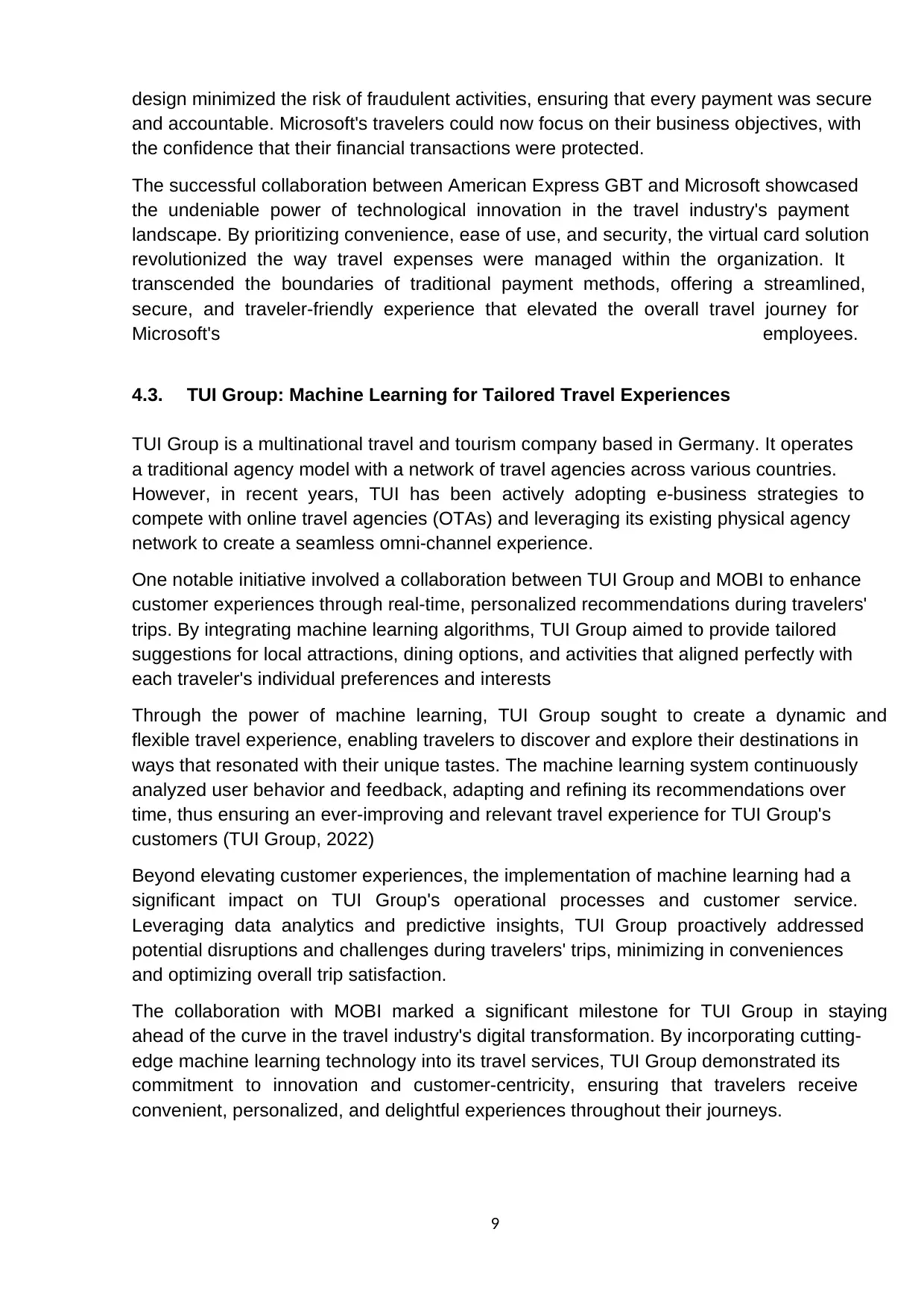
9
design minimized the risk of fraudulent activities, ensuring that every payment was secure
and accountable. Microsoft's travelers could now focus on their business objectives, with
the confidence that their financial transactions were protected.
The successful collaboration between American Express GBT and Microsoft showcased
the undeniable power of technological innovation in the travel industry's payment
landscape. By prioritizing convenience, ease of use, and security, the virtual card solution
revolutionized the way travel expenses were managed within the organization. It
transcended the boundaries of traditional payment methods, offering a streamlined,
secure, and traveler-friendly experience that elevated the overall travel journey for
Microsoft's employees.
4.3. TUI Group: Machine Learning for Tailored Travel Experiences
TUI Group is a multinational travel and tourism company based in Germany. It operates
a traditional agency model with a network of travel agencies across various countries.
However, in recent years, TUI has been actively adopting e-business strategies to
compete with online travel agencies (OTAs) and leveraging its existing physical agency
network to create a seamless omni-channel experience.
One notable initiative involved a collaboration between TUI Group and MOBI to enhance
customer experiences through real-time, personalized recommendations during travelers'
trips. By integrating machine learning algorithms, TUI Group aimed to provide tailored
suggestions for local attractions, dining options, and activities that aligned perfectly with
each traveler's individual preferences and interests
Through the power of machine learning, TUI Group sought to create a dynamic and
flexible travel experience, enabling travelers to discover and explore their destinations in
ways that resonated with their unique tastes. The machine learning system continuously
analyzed user behavior and feedback, adapting and refining its recommendations over
time, thus ensuring an ever-improving and relevant travel experience for TUI Group's
customers (TUI Group, 2022)
Beyond elevating customer experiences, the implementation of machine learning had a
significant impact on TUI Group's operational processes and customer service.
Leveraging data analytics and predictive insights, TUI Group proactively addressed
potential disruptions and challenges during travelers' trips, minimizing in conveniences
and optimizing overall trip satisfaction.
The collaboration with MOBI marked a significant milestone for TUI Group in staying
ahead of the curve in the travel industry's digital transformation. By incorporating cutting-
edge machine learning technology into its travel services, TUI Group demonstrated its
commitment to innovation and customer-centricity, ensuring that travelers receive
convenient, personalized, and delightful experiences throughout their journeys.
design minimized the risk of fraudulent activities, ensuring that every payment was secure
and accountable. Microsoft's travelers could now focus on their business objectives, with
the confidence that their financial transactions were protected.
The successful collaboration between American Express GBT and Microsoft showcased
the undeniable power of technological innovation in the travel industry's payment
landscape. By prioritizing convenience, ease of use, and security, the virtual card solution
revolutionized the way travel expenses were managed within the organization. It
transcended the boundaries of traditional payment methods, offering a streamlined,
secure, and traveler-friendly experience that elevated the overall travel journey for
Microsoft's employees.
4.3. TUI Group: Machine Learning for Tailored Travel Experiences
TUI Group is a multinational travel and tourism company based in Germany. It operates
a traditional agency model with a network of travel agencies across various countries.
However, in recent years, TUI has been actively adopting e-business strategies to
compete with online travel agencies (OTAs) and leveraging its existing physical agency
network to create a seamless omni-channel experience.
One notable initiative involved a collaboration between TUI Group and MOBI to enhance
customer experiences through real-time, personalized recommendations during travelers'
trips. By integrating machine learning algorithms, TUI Group aimed to provide tailored
suggestions for local attractions, dining options, and activities that aligned perfectly with
each traveler's individual preferences and interests
Through the power of machine learning, TUI Group sought to create a dynamic and
flexible travel experience, enabling travelers to discover and explore their destinations in
ways that resonated with their unique tastes. The machine learning system continuously
analyzed user behavior and feedback, adapting and refining its recommendations over
time, thus ensuring an ever-improving and relevant travel experience for TUI Group's
customers (TUI Group, 2022)
Beyond elevating customer experiences, the implementation of machine learning had a
significant impact on TUI Group's operational processes and customer service.
Leveraging data analytics and predictive insights, TUI Group proactively addressed
potential disruptions and challenges during travelers' trips, minimizing in conveniences
and optimizing overall trip satisfaction.
The collaboration with MOBI marked a significant milestone for TUI Group in staying
ahead of the curve in the travel industry's digital transformation. By incorporating cutting-
edge machine learning technology into its travel services, TUI Group demonstrated its
commitment to innovation and customer-centricity, ensuring that travelers receive
convenient, personalized, and delightful experiences throughout their journeys.
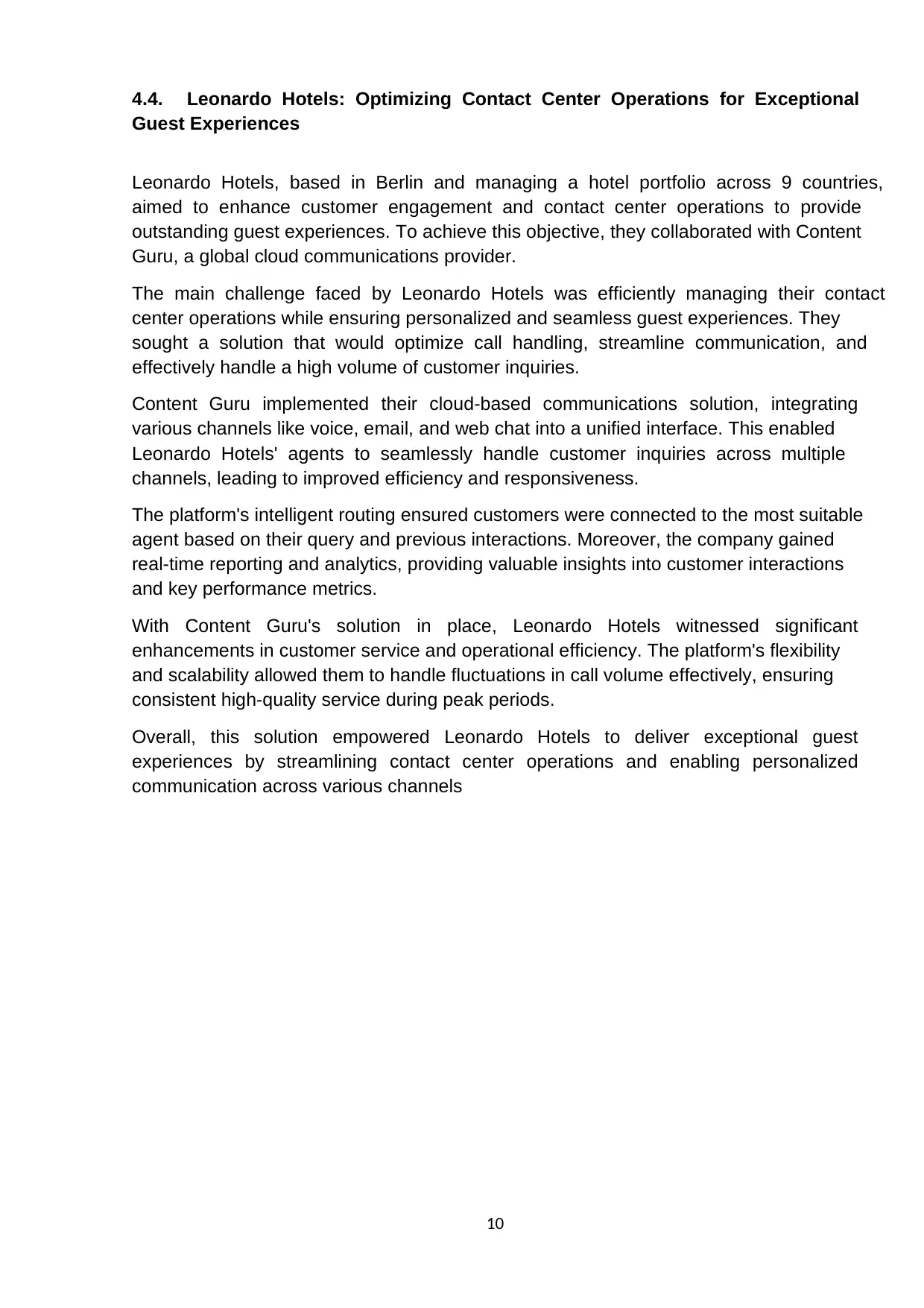
10
4.4. Leonardo Hotels: Optimizing Contact Center Operations for Exceptional
Guest Experiences
Leonardo Hotels, based in Berlin and managing a hotel portfolio across 9 countries,
aimed to enhance customer engagement and contact center operations to provide
outstanding guest experiences. To achieve this objective, they collaborated with Content
Guru, a global cloud communications provider.
The main challenge faced by Leonardo Hotels was efficiently managing their contact
center operations while ensuring personalized and seamless guest experiences. They
sought a solution that would optimize call handling, streamline communication, and
effectively handle a high volume of customer inquiries.
Content Guru implemented their cloud-based communications solution, integrating
various channels like voice, email, and web chat into a unified interface. This enabled
Leonardo Hotels' agents to seamlessly handle customer inquiries across multiple
channels, leading to improved efficiency and responsiveness.
The platform's intelligent routing ensured customers were connected to the most suitable
agent based on their query and previous interactions. Moreover, the company gained
real-time reporting and analytics, providing valuable insights into customer interactions
and key performance metrics.
With Content Guru's solution in place, Leonardo Hotels witnessed significant
enhancements in customer service and operational efficiency. The platform's flexibility
and scalability allowed them to handle fluctuations in call volume effectively, ensuring
consistent high-quality service during peak periods.
Overall, this solution empowered Leonardo Hotels to deliver exceptional guest
experiences by streamlining contact center operations and enabling personalized
communication across various channels
4.4. Leonardo Hotels: Optimizing Contact Center Operations for Exceptional
Guest Experiences
Leonardo Hotels, based in Berlin and managing a hotel portfolio across 9 countries,
aimed to enhance customer engagement and contact center operations to provide
outstanding guest experiences. To achieve this objective, they collaborated with Content
Guru, a global cloud communications provider.
The main challenge faced by Leonardo Hotels was efficiently managing their contact
center operations while ensuring personalized and seamless guest experiences. They
sought a solution that would optimize call handling, streamline communication, and
effectively handle a high volume of customer inquiries.
Content Guru implemented their cloud-based communications solution, integrating
various channels like voice, email, and web chat into a unified interface. This enabled
Leonardo Hotels' agents to seamlessly handle customer inquiries across multiple
channels, leading to improved efficiency and responsiveness.
The platform's intelligent routing ensured customers were connected to the most suitable
agent based on their query and previous interactions. Moreover, the company gained
real-time reporting and analytics, providing valuable insights into customer interactions
and key performance metrics.
With Content Guru's solution in place, Leonardo Hotels witnessed significant
enhancements in customer service and operational efficiency. The platform's flexibility
and scalability allowed them to handle fluctuations in call volume effectively, ensuring
consistent high-quality service during peak periods.
Overall, this solution empowered Leonardo Hotels to deliver exceptional guest
experiences by streamlining contact center operations and enabling personalized
communication across various channels
⊘ This is a preview!⊘
Do you want full access?
Subscribe today to unlock all pages.

Trusted by 1+ million students worldwide
1 out of 14
Related Documents
Your All-in-One AI-Powered Toolkit for Academic Success.
+13062052269
info@desklib.com
Available 24*7 on WhatsApp / Email
![[object Object]](/_next/static/media/star-bottom.7253800d.svg)
Unlock your academic potential
Copyright © 2020–2025 A2Z Services. All Rights Reserved. Developed and managed by ZUCOL.




